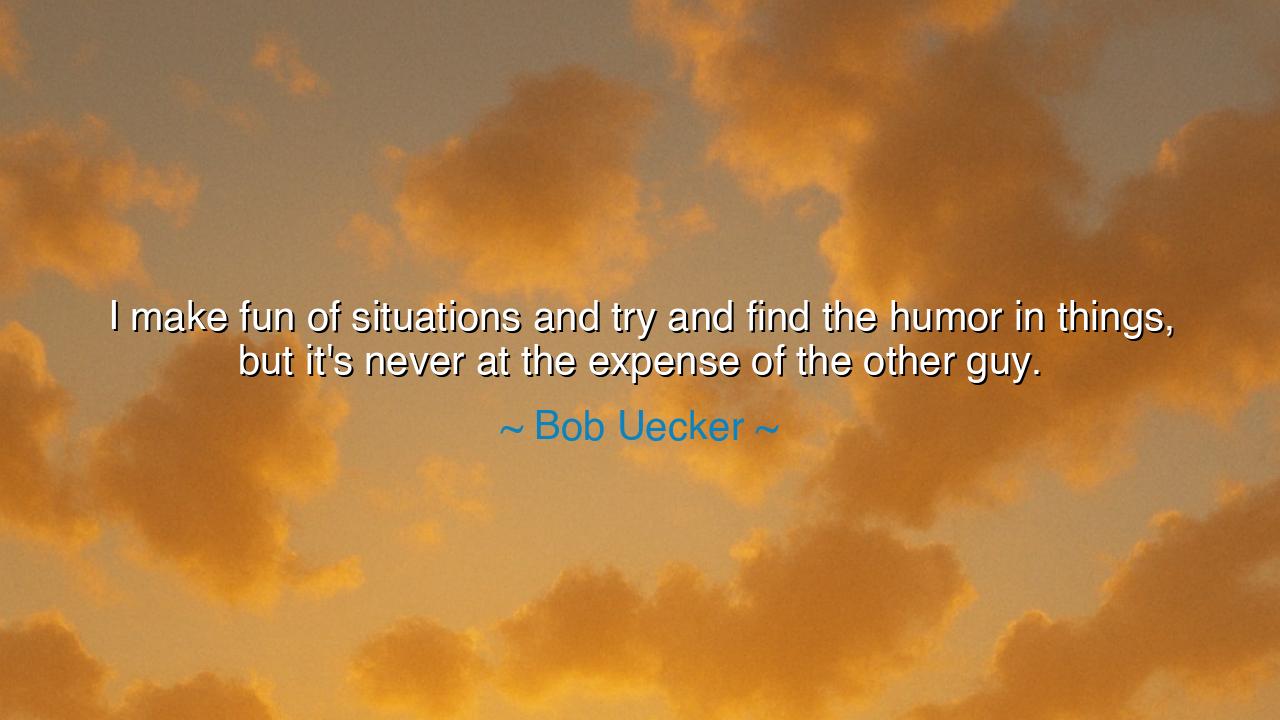
I make fun of situations and try and find the humor in things
I make fun of situations and try and find the humor in things, but it's never at the expense of the other guy.






When Bob Uecker said, “I make fun of situations and try and find the humor in things, but it's never at the expense of the other guy,” he was speaking of a wisdom that transcends mere comedy. His words reveal a code of honor in laughter — that true humor is not cruelty disguised as wit, but insight rendered with empathy. To laugh at life without diminishing others is to embrace the fullness of human experience: the absurdity, the irony, the folly — all without wounding the dignity of a fellow soul. Uecker reminds us that humor can illuminate, uplift, and teach, but never when it is wielded as a weapon against another.
The ancients would have understood this perfectly. Socrates often employed irony, but never to harm; he exposed folly to awaken, not to humiliate. Humor, in the eyes of the wise, is a tool of understanding and liberation, not derision. To mock circumstances, to see the absurdity in life, is a celebration of perspective, a recognition that while we are all imperfect, we need not destroy one another to survive the folly around us. Uecker’s philosophy mirrors this ancient insight: humor is most potent when it lifts, not crushes.
Consider the realm in which Uecker thrived: baseball, a stage of triumph and disaster, where the smallest error can become legend. He turned his own missteps, the slip of a bat, the missed ball, the absurdities of the sport, into laughter for the crowd. Yet he never mocked a teammate for failure; he spared the dignity of the “other guy.” In this, he echoed the wisdom of the ancients — that the truly funny man is one who can find humor in life without wounding others, who can laugh with humanity rather than at humanity. His humor became a unifying force, not a weapon of division.
Even in history, leaders and philosophers understood this balance. Abraham Lincoln, known for his wit and storytelling, often used humor to defuse tension or highlight folly, never to humiliate those around him. During the pressures of war, he would make jokes about bureaucratic absurdities, about himself, about the world — but he avoided personal cruelty. In this, he demonstrated the same principle Uecker describes: that humor directed at situations strengthens community and character, whereas humor directed at people can corrode it.
Uecker’s method also speaks to the profound insight that laughter is a mirror for perspective. When we find the humor in situations — the irony, the unexpected, the absurd — we rise above frustration, fear, and despair. Humor becomes a means of survival, a tool to see the world more clearly. But when we aim that laughter at others, we betray the ethical potential of humor. The ancients taught that joy should not be purchased at the expense of dignity. Uecker’s wisdom reflects that same principle: the greatest laughter is shared, not destructive.
In a more intimate sense, his words remind us of humility. To laugh at life and ourselves is an acknowledgment of imperfection; to spare others from ridicule is an acknowledgment of their humanity. By making situations the object of laughter, rather than the people, we cultivate empathy alongside insight. This is a rare form of strength: to recognize folly without feeding arrogance, to amuse without injuring, to enlighten without condemning. Uecker embodies this in both life and art, teaching that humor is as much moral as it is comic.
The lesson, then, is enduring: when you wield humor, direct it wisely. Seek the absurdity in situations, the irony in circumstance, the incongruities that make life vibrant. Do not use laughter to harm others, for that is the laughter of the weak and the cruel. Instead, let your humor be a bridge, a light, a balm for both self and community. As Bob Uecker demonstrates, true humor uplifts, enlightens, and unites, reminding us that joy is most profound when it is compassionate.
In practice, this means observing the world carefully, laughing at your own errors and life’s contradictions, and sharing that laughter generously — without pointing fingers or diminishing others. Humor becomes a force for resilience, for connection, for understanding. By following Uecker’s counsel, one transforms not only moments of folly into moments of joy, but also builds a life guided by both laughter and integrity, echoing the wisdom of the ancients: to amuse without cruelty is to live wisely and well.






AAdministratorAdministrator
Welcome, honored guests. Please leave a comment, we will respond soon